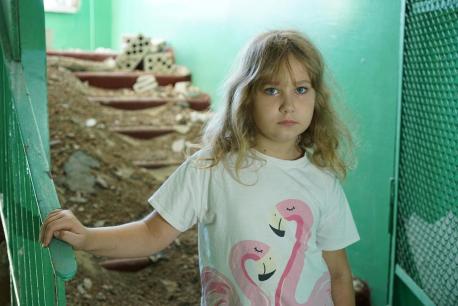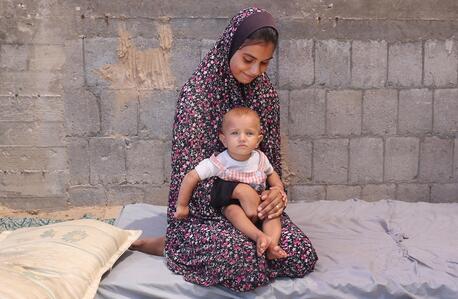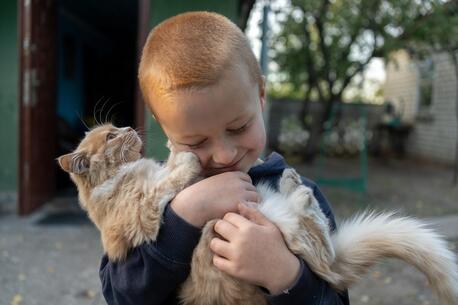
Your Donation Can Help Child Refugees from Ukraine
The war in Ukraine resulted in one of the fastest-growing refugee crises since World War II. Millions of children remain vulnerable.
The war in Ukraine has resulted in one of the fastest-growing refugee crises since World War II. One-third of the country has been forced to leave home. Millions of children are displaced both inside Ukraine and in Poland, Moldova, Romania and other refugee-hosting neighboring countries.
Children and families are facing food and water shortages and a lack of access to essential health services. Many are out of school. With winter approaching, their lives are at an even greater risk. UNICEF is working on the ground to help mitigate the devastating consequences of the war and to help ensure a better future for Ukraine’s children.
How UNICEF is helping the people of Ukraine
UNICEF is providing emergency support for children and families inside Ukraine and those who’ve fled to refugee-hosting countries. UNICEF’s programming covers safety, nutrition, health, safe drinking water and education. The organization has brought on additional staff to help with the increased humanitarian need since the war began.
UNICEF is focusing on addressing children’s immediate needs — making sure children inside Ukraine and those in neighboring countries have access to safe drinking water, for example — while also working to protect children’s rights.

Nataliya Gorbachova, a 35-year-old mother, and her children fled their home in Sloviansk, Ukraine, soon after the war started. The family struggled in Sarny, then the UNICEF mobile team came to their aid. © UNICEF/UN0692173/Trofimchuk
The war in Ukraine's impact on children
The war in Ukraine has had a devastating impact on children’s health, well-being and development. Children have been displaced and many have lost loved ones and caretakers. Many are unable to return to school and fear for their safety. Children and women are at increased risk of gender-based violence when they are on the move, sheltering or seeking asylum.

In August 2022, 8-year-old Denys from Kherson, sits on a bed with other children at Tvoya Opora — a community-built and -funded shelter in Lviv, Ukraine, for people displaced by the war. ©UNICEF/UN0686477/Gilbertson - Highway Child
What support services are interrupted by the war in Ukraine?
Hundreds of essential buildings like hospitals, schools and kindergartens across the country have been damaged or destroyed. Millions of children cannot return to school or do not have access to the technology or electricity to continue learning online.
More than 13 million refugees have fled Ukraine — over 90 percent of them women and children. Inside the country, over 7 million people are internally displaced, including 2.8 million children.
Millions of families cannot access health care, safe drinking water, food or social services. Ukrainian child refugees who are travelling alone or are separated from parents or other adult caregivers are more vulnerable to trafficking, sexual and labor exploitation and abuse, and are in need of increased psychosocial services and protection.
How is UNICEF helping in Ukraine?
UNICEF is on the ground helping Ukraine with critical care and support for children and families. Some highlights of UNICEF’s recent work include:
Supporting the health needs of Ukrainian children
- supporting health care facilities and maternity wards so that children, women and babies can access adequate and safe health care
- distributing kits with everything needed for a baby’s first month to thousands of new parents
- reaching children and families in conflict-affected areas with mobile teams of doctors, nurses and psychologists
- providing safe drinking water to millions of Ukrainians with water treatment chemicals, distributing bottled water and improving water availability
Protecting children and safeguarding their futures
- providing children inside Ukraine who have been separated from their families with reunification support
- establishing Spilno (“together” in Ukrainian) Spots across Ukraine to provide support services for children and their caregivers
- building safe havens across seven bordering refugee-hosting countries that provide Ukrainians fleeing the country with shelter, food, information, essential services and a safe place for children to play
- reaching millions of people with critical messages about their rights and information on how to access essential services

Artem, 6, from Ukraine, is getting ready to start first grade in Poland. He is looking forward to his first day at the Ukrainian school in Krakow. Artem and his mom came to Krakow in March, fleeing the war in Ukraine. ©UNICEF/UN0694631/Moskalenko
Helping Ukrainian children receive an education
- establishing an online platform that provides formal and non-formal education to children whose education has been interrupted by the war
- providing school supplies such as School-in-a-Box kits to thousands of children
- providing laptops for teachers whose schools have been destroyed by the war to help them continue to provide students with education
- working to rebuild schools that have been damaged or destroyed so students can return to in-person learning in areas where it is safe

Tosia from Lesisko, Poland, and Sonia, from Zaporizhzhya, Ukraine, draw together at a Scouts camp in Poland. They are best friends. “I already speak a little bit of Polish; it’s getting better and better every day. Tosia is helping me learn new words,” Sonia says. ©UNICEF/UN0689346/Pospiszyl
What can I do to help support Ukraine’s children?
Supporting UNICEF helps reach more vulnerable children in Ukraine and in refugee-hosting countries with essential nutrition and health services, protection and education. Please donate.
Frequently Asked Questions
How many children have been displaced since the start of the crisis?
Millions of Ukrainian families have fled the country, fearing for their lives and safety since the war started on Feb. 24, 2022. A total of 13.9 million Ukrainians are displaced, including 7 million who are internally displaced in Ukraine and 6.9 million refugees recorded across Europe.
Are children in Ukraine able to return to school?
As the school year begins, 4 million children in Ukraine are unsure whether they will be able to resume learning. Many schools have been destroyed and others are unsafe to inhabit. Fewer than 60 percent of schools can be reopened safely. UNICEF is working with partners to ensure as many children as possible can resume learning, whether online or in person.
How is the war in Ukraine affecting families?
The war in Ukraine has separated families, creating devastating immediate and long-term consequences for children and caregivers. Around 90 percent of Ukrainian refugees are women and children; men between the ages of 18 and 60 are mandated to stay in the country.
Further Reading
How UNICEF Built a Supply Pipeline to Support Response to Ukraine War
Since the war started, UNICEF has delivered more than 8,500 metric tons of lifesaving items to Ukraine, including health kits containing medicine and first aid supplies, and water purification tablets.
Humanitarian Cash Transfers Provide Vital Aid for Ukraine’s Families
Families in Ukraine are facing impossible circumstances. UNICEF has distributed $125 million in emergency cash assistance to families with children in Ukraine. Through this program, caretakers receive fast and flexible funding they can use to meet their children's most urgent needs.
Getting Ukraine’s Children Back to Learning Is a UNICEF Priority
As the school year begins, 4 million children in Ukraine are left in limbo, wondering if their school is still standing or whether it’s safe to go to school. UNICEF is on the ground working with partners to ensure children can continue receiving an education.
Help UNICEF reach more children impacted by war in Ukraine.
HOW TO HELP
There are many ways to make a difference
War, famine, poverty, natural disasters — threats to the world's children keep coming. But UNICEF won't stop working to keep children healthy and safe.
UNICEF works in over 190 countries and territories — more places than any other children's organization. UNICEF has the world's largest humanitarian warehouse and, when disaster strikes, can get supplies almost anywhere within 72 hours. Constantly innovating, always advocating for a better world for children, UNICEF works to ensure that every child can grow up healthy, educated, protected and respected.
Would you like to help give all children the opportunity to reach their full potential? There are many ways to get involved.





